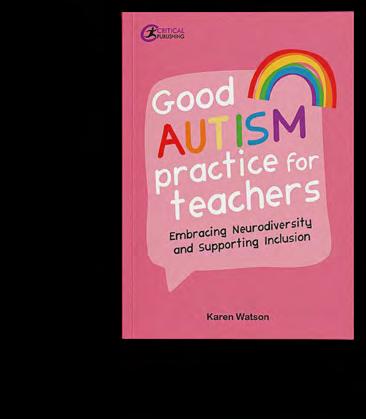
4 minute read
Reviews THE JOY OF KNOWING PETE
The Joy of knowing Pete’ is a heart-warming story about how a family supports a young man, Pete, who was born with Down’s syndrome and severe learning disabilities. This book looks in depth at family life and the challenges they faced, along with the joy and experiences that Pete gave them. The author, Pete’s mother, provides us with memorable insight to her life and the lives of her family. You get a sense of the strong bond they have, mainly providing support and caring for Pete. Pete’s brother, Philip, describes his life as a triangle with Pete in the middle.

Hazel shows the importance of developing experiences for those who are non-verbal with complex needs, and how vital it is to respect their ability to communicate, whether this is verbally, or with gestures and eye movement, etc. It is apparent that the family adapted their lives to best fulfil and engage Pete in family life and the wider community.
Pete’s friends and wider support network provided the most memorable experiences and joys in his life, and there is a significant focus on his love of music and food. It shows that having people from a variety of backgrounds, connected through their love and care of a special person, has the maximum impact on the
Author: Hazel Morgan
Publisher: Youcaxton
ISBN: 978-1-914424-52-6
Reviewed by: Heather Porter, SEN teacher lives of those caring for someone with complex needs, in whatever capacity.
It is clear that Pete has inspired the family. Hazel’s change of career and the detail offered in this book will help change society, develop inclusion and, ultimately, change the way we care for those with learning disabilities.
Good Autism Practice For Teachers
Karen Watson has written ‘Good Autism Practice for Teachers’ to share research and provide practical advice for teachers seeking to create an inclusive classroom. Part one shares the theory and research underpinning current good practice and encourages teachers to critically examine their own practice. Part two provides strategies and resources, including checklists and practical guidance, which draw from the evidence-base and allow teachers to make informed decisions about how best to put inclusion into practice.

Throughout the book, Watson promotes the importance of educators continually questioning, thinking critically about their work and challenging themselves.
This book is, therefore, an asset for encouraging reflective practice in educators, whether they are new or experienced. It is worth noting that Karen Watson’s experience was in the Scottish system, although she has taken steps to ensure other systems are adequately represented throughout the book.
Author: Karen Watson
Publisher: Critical Publishing
ISBN: 978-1-914171-47-5
Price: £18.99
Reviewed by:Ffion Robinson, nasen education officer
At the end of each short section, Watson provides helpful ‘case study’ style examples of how dysfunctions present in the classroom. She asks probing questions to encourage readers to critically reflect and encourages the reader to take time to consider the implications and applications of what has been covered in that section.
This book will be useful to practitioners in specialist and mainstream settings, in both primary and secondary environments. It will be a helpful reference for teachers to keep close at hand when seeking ideas to support anything, from executive function difficulties and sensory differences to language and communication challenges.
There is always a steady stream of questions arriving at nasen House and, of course, the Education Team answers them as soon as possible. But while many of them are specific to a particular context, the answers to a number of them could be helpful to the wider nasen membership. ‘Ask the team’ provides the space to share these questions and answers.
01827 311500
@nasen_org education@nasen.org.uk @nasen.org

Quiet Zones
We want to create a quiet zone at lunch and break times for our pupils that need to decompress. We have limited space aside from classrooms, the hall is used for sports activities and the dining room, once lunch has finished, is being tidied and is often very noisy. Any suggestions?
Primary SENCO, Harrogate
The playground, while a great space for those who need to expend their energy, is often not a great space for those who need to decompress. Providing ear defenders and bean bags or mats for pupils who wish to have some quiet time in a roped off area of the playground may help, if it is large enough for a separate section. Similarly, if a classroom or library could be used for time away, or if a curtained area of a classroom that can be supervised is available, they could also be helpful
Supporting Independence
My son is autistic and doing very well in year 12 and progressing well in his A-levels. He is considering university and I am starting to investigate technology that will support him to be independent and support the way he thinks. Are you able to point me to technology that is available to support him?
Parent, Durham
Assistive Technology
I would like to extend the use of assistive technology to more pupils than just those with SEND within our school. We are fortunate to have had a class set of Chromebooks purchased by the PTA, however, our IT support department has asked what we want installed to support learning. Is there a prescribed list of resources that you can recommend?
AHT, Dewsbury www.nasen.org.uk
We are not able to provide a prescribed list of resources, but in the Assistive Technology section of our website (https://bit.ly/3z6GDwj) you will find an audit tool that will be useful in identifying areas that are most in need of development. There is also a list of resources and products that may be useful and a link to the webinars from Microlink that update you on what’s new in assistive technology to help identify the latest in AT support.
As he is autistic he will be able to apply for Disabled Students Allowance (DSA) and, as part of this, he will have a Study Needs Assessment (SNA) interview, where he will discuss the type and level of support required. The report produced as a result of the Needs Assessment Report (NAR) is the basis of any DSA support provided.
When completed and agreed the NAR is sent to the Student Loans Company (SLC) for approval, alongside any quotes for recommended goods or services.
The list of products will be included here; they will reflect the discussion and be considered suitable to address his independence and accessibility needs.
It may be helpful to contact the university and speak to a disability adviser; they could take you both through the process and perhaps introduce you to current students to talk about their experience. We wish him luck in his future studies.










